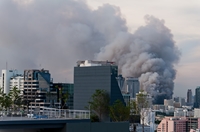Despite a significant increase in the number of officially declared natural disasters, 90 percent of Americans remain unprepared for an evacuation or emergency.
According to Government Security News, the number of major disasters and fire declarations has doubled in the last decade. However, a recent survey by Allstate found that nearly the entire nation remains unprepared for a crisis. Despite 92 percent of American's having lived through one form of natural disaster or another, only 10 percent have practiced an evacuation plan, and 30 percent revealed they would ignore evacuation orders.
"No one should risk putting themselves or their family in danger," said Mark McGillivray, Allstate's senior vice president of Claims. "While we see some progress since surveying consumers a couple of years ago, the latest survey results demonstrate there is still work to do to remind people that Mother Nature can strike at any time, any place. It is important for individuals and families to be ready, just in case the unthinkable happens."
This translates into considerable risk for businesses as well, as many of these individuals are likely to ignore similar warnings or planning in their professional lives. Business continuity planning and analysis has to take into account every asset, from employees to technology, and if a worker ignores the company strategy it puts everyone at risk.
By investing in high-quality business continuity consultants, companies can minimize their risks and persuade employees of the dangers of such disasters, getting them on board with both workplace and home disaster preparedness. This can help protect individuals and other company assets while promoting a healthier, safer work environment all around. FEMA and Allstate offer free tools to boost private disaster planning, but businesses need to consider a much broader set of needs to prepare for a crisis and the following recovery efforts.

